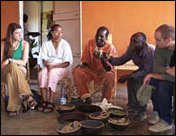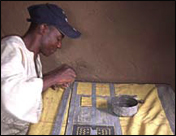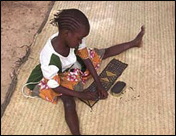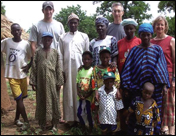Ethics and Development in Mali
- Stephen L. Esquith, Ph.D.
- Professor, Department of Philosophy
- Residential College in the Arts and Humanities (RCAH)

Students learn about natural dyes from Boubacar Doumbia (center), head of Groupe Kasobane Atelier in Segou, Mali. Doumbia will visit MSU next year to teach a fabric workshop with Worland and exhibit his own textiles at the MSU Museum.
It started out as a simple study abroad program: Ethics and Development in Mali.
Over the past several summers, MSU undergraduates have traveled to meet and work with the artists, writers, scientists, and teachers in Mali who are responding to the extraordinary challenges faced by this developing country. The program affords students a close-up view of the Malians' struggle with problems of health, education, poverty, and spiritual well-being.

Binde Traore does bogolan fabric art at his family compound in Kolokani, Mali.
The students participate in debates about how to resolve these issues democratically, as the Malians are attempting to do: Should Mali permit the production of genetically modified foods? Should traditional arts and crafts be insulated from further commercialization, or should artists be encouraged to adapt their work for mass consumption? How should issues of gender discrimination and violence against women be addressed?
Stephen Esquith, who designed and directs the program, said, "Our goal is to help the students understand the complexity of these issues, and that what happens in countries such as Mali has a profound effect on their lives here at home."
Over time Dr. Esquith, Chris Worland (a fabric artist and member of the MSU Museum Board), and Yoby Guindo (their Malian partner, who works with CARE Mali) found themselves coming back to work with the same three or four groups every trip, expanding the relationships as mutual trust and regard took root. "We are closely involved with the Kasobane art collective in Segou," said Esquith. "They teach in local schools and do fabric art, in particular, mudcloth. Their focus is on preserving the meanings associated with this traditional practice while developing new economic opportunities for their students. This is an instructive model of how to preserve cultural traditions, maintain artistic integrity, and make a living through creative work."

Binde's daughter was an instructor in his 2006 fabric workshop for MSU students.

Sam Worland-Esquith, Stephen Esquith, and Chris Worland (back row) pose with Sam's host family in Diokeli, Mali, where Sam was a Peace Corps volunteer in 2001.
Another key partner is the University of Bamako's Rural Polytechnic Institute, where Esquith taught ethics and development to Malian students as a Fulbright Scholar in 2005-2006 and whose director, Dr. Fafre Samake, has worked closely for many years with MSU agricultural economics professors John Staatz and Nango Dembele to design the study abroad materials on agriculture.
With funding from the MSU Museum and MSU's International Studies and Programs, the partnership with Kasobane has become an incubator for a number of exchange projects between MSU and the West Africans. "In spring 2009," said Esquith, "two artists from the Kasobane collective, Boubacar Doumbia and Kandiourou Coulibaly, will visit RCAH as artists-in-residence. Their work will be part of an exhibition of West African textiles at the MSU Museum, curated by Worland."
Other RCAH projects that have grown out of this study abroad program include a partnership with MSU's Center for Advanced Study in International Development to run an exchange program with twelve Islamic leaders from Mali, beginning in fall 2008.
- Written by Linda Chapel Jackson, University Outreach and Engagement